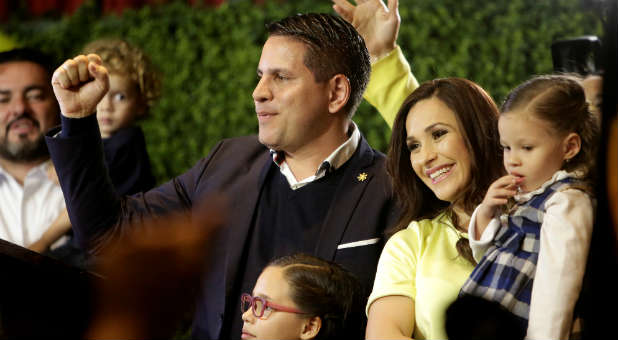Will Costa Rica’s Newest President Be a Famous Christian Singer?
Christian singer Fabricio Alvarado Munoz will face a center-left fiction writer in Costa Rica’s presidential election runoff, seeking to thwart the advance of gay rights with a victory for evangelical conservatives in the Central American nation.
The former TV anchor won the first round on Sunday but fell far short the 40 percent of votes needed to avert a second-round. He will compete in the runoff on April 1 against former Labor Minister Carlos Alvarado Quesada, who was also once a singer – in a progressive rock band.
The rise of Alvarado Munoz on a ticket fiercely opposing gay marriage was helped by the decline of a centrist two-party system that stretched back decades in a country long considered one of the most stable in Latin America.
His success reflects the rise of evangelical churches in the region which Javier Corrales, a political science professor at Amherst College, says are helping to lead a coordinated backlash against the expansion of lesbian, gay, bisexual and transgender (LGBT) rights.
“There’s nothing more progressive than defending life and family,” Alvarado Munoz said on Sunday. He added on Monday that no members of his cabinet would support gay marriage or abortion.
The telegenic writer of Christian songs such as “Your Love is Everything,” won 24.9 percent of Sunday’s vote. He was elected to the national assembly in 2014 as the only federal deputy representing the Christian-backed National Restoration Party (PRN).
On Monday, the PRN appeared to have increased its presence in the national assembly to 14 seats. The party has opposed the progressive policies of outgoing President Luis Guillermo Solis, such as same-sex marriage, in vitro fertilization and sex education in schools.
A well-known television news anchor before he turned to religion, Alvarado Munoz shot to political prominence during the campaign by denouncing a ruling by the Inter-American Court of Human Rights calling on Costa Rica to give civil marriage rights to same-sex couples.
“All the vestiges of gender ideology will be eliminated from public policy in Costa Rica,” he said in his government plan.
The rise of protestant churches in Latin America has filtered into politics across the region. Guatemala’s President Jimmy Morales and Brazilian presidential candidate Marina Silva are both evangelical.
Almost one-fifth of Latin Americans now identify as protestant, according to a 2014 paper by Pew Research Center. Most are Pentecostalists, a movement that emphasizes divine experiences such as miraculous healing and prophesies, and has become a force in conservative Latin American politics.
“They are transforming conservative politics in the region, giving homophobia a new momentum and posing new roadblocks to the expansion of LGBT rights,” Amherst’s Corrales said in a draft of a new paper on the topic.
‘Love and Happiness”
Unlike his rival, Alvarado Quesada backs the court’s decision on same-sex couples. Even though Costa Rica’s 3.3 million voters mostly describe themselves as conservative, he appears to have benefited by energizing voters worried by the strident tone of the campaign.
The former Procter & Gamble employee has also tried to connect with young voters, highlighting his university rock band Dramatika and career as a fiction writer. He has a master’s degree from Britain’s University of Sussex, and his last novel was titled “Brighton Season.”
“The Costa Rica of the 21st century needs a government that knows how to advance with strength, love and happiness, the agenda of equality,” Alvarado Quesada said in a speech on Sunday evening. He won 21.6 percent of the vote in the first round.
On Monday he said he would lead the transition to a renewable resource-based economy and seek to promote electric cars.
The two Alvarados, who are not related, will now fight for the votes of third-place finisher Antonio Alvarez Desanti, who accepted defeat on Sunday evening with 18.8 percent of the vote, and 10 other candidates from the first round.
Whoever wins, he will have to work with other parties in Congress to get legislation passed. {eoa}
© 2018 Thomson Reuters. All rights reserved.















































